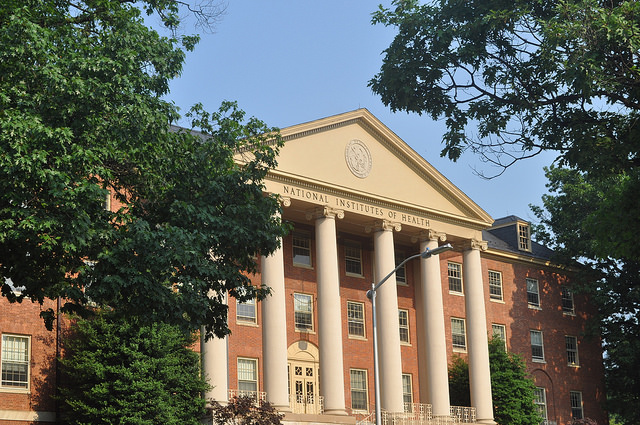NIH Director Francis Collins, along with the leaders of NIH’s institutes, centers, and offices, have written a letter emphasizing their continuing commitment to basic science.
Despite past assurances to this effect (e.g., Collins 2012), the NIH leadership is concerned that the community may feel that NIH has moved away from basic research. The letter, which was published in the March 25 issue of the journal Science, rejects the notion that “NIH’s interest in basic science is flagging” (Collins et al. 2016).
They address the concern that the “Public Health Relevance” statement required in grant applications means that all NIH-supported research must be expected to result in an immediate public health benefit; NIH has revised the instructions for this statement to reflect NIH’s “commitment to supporting a robust, diverse research portfolio, including the pursuit of basic biological knowledge.”
The current letter emphasizs that basic research investments have yielded significant discoveries in the past and express the belief that this will continue:
For this track record of success to continue, we must continue our vigorous support of the pursuit of fundamental knowledge. All of NIH’s senior leaders believe strongly that progress toward these goals occurs most rapidly when investigators pursue their passions, whether they lie in basic research or in applied, disease-focused studies. By supporting a broad portfolio of basic, translational, population, and clinical research, NIH will continue to lead the way toward a healthier future. (Collins et al. 2016)
There are reasons to suspect that investigators may be the ones moving away from basic research applications. A 2014 analysis by the National Institute of Neurological Disorders and Stroke, for example, did observe a “gradual and significant decline in the number of basic grants awarded between 1997 and 2012,” but found this was due to a decrease in submissions of basic research applications; in fact, basic grant applications did better in peer review than applied research proposals (Landis 2014).
GSA welcomes your thoughts on support for basic research at NIH and other federal agencies.
CITATIONS
F.S. Collins. 2012. NIH Basics. Science 337(6094): 502. DOI: 10.1126/science.1227820
F.S. Collins, J.M. Anderson, C.P. Austin, J.F Battery, L.S. Birnbaum, J.P. Briggs, J.A. Clayton, B. Cuthbert, R.W. Eisinger, A.S. Fauci, J.I. Gallin, G.H. Ginnos, R.I. Glass, M.M. Gottesman, P.A. Gray, E.D. Green, F.B. Greider, R. Hodes, K.L. Hudson, B. Humphreys, S.I. Katz, G.F. Koob, W.J. Koroshetz, M.S. Lauer, J.R. Lorsch, D.R. Lowy, J.J. McGowan, D.M. Murray, R. Nakamura, A. Norris, E.J. Perez-Stable, R.I. Pettigrew, W.T. Riley, G.P. Rodgers, P.A. Sieving, M.J. Somerman, C.Y. Spong, L.A. Tabak, N.D. Volkow, and E.L. Wilder. (2016). Basic science: Bedrock of progress. Science 351(6280): 1405. DOI: 10.1126/science.351.6280.1405-a
S. Landis. (2014). “Back to Basics: A call for fundamental neuroscience research.” NINDS blog, March 27, 2014.













